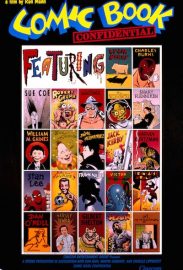Enjoy a free preview via Film Discovery! Click here !
Enjoy a free preview via Film Discovery! Click here !
Enjoy a free preview via Film Discovery! Click here !
Enjoy a free preview via Film Discovery! Click here !

https://www.filmplatform.net/product/comic-book-confidential
The film includes profiles of twenty-two notable and influential talents in the comics field, such as Charles Burns, Art Spiegelman, Françoise Mouly, Frank Miller, Stan Lee, Will Eisner, Robert Crumb, Harvey Pekar and William M. Gaines. In interviews, the creators discuss their contributions and history, and read passages from their works over filmograph animations. Montages of comics through the decades, archival scenes of politically important moments, and a live-action Zippy the Pinhead are featured.
